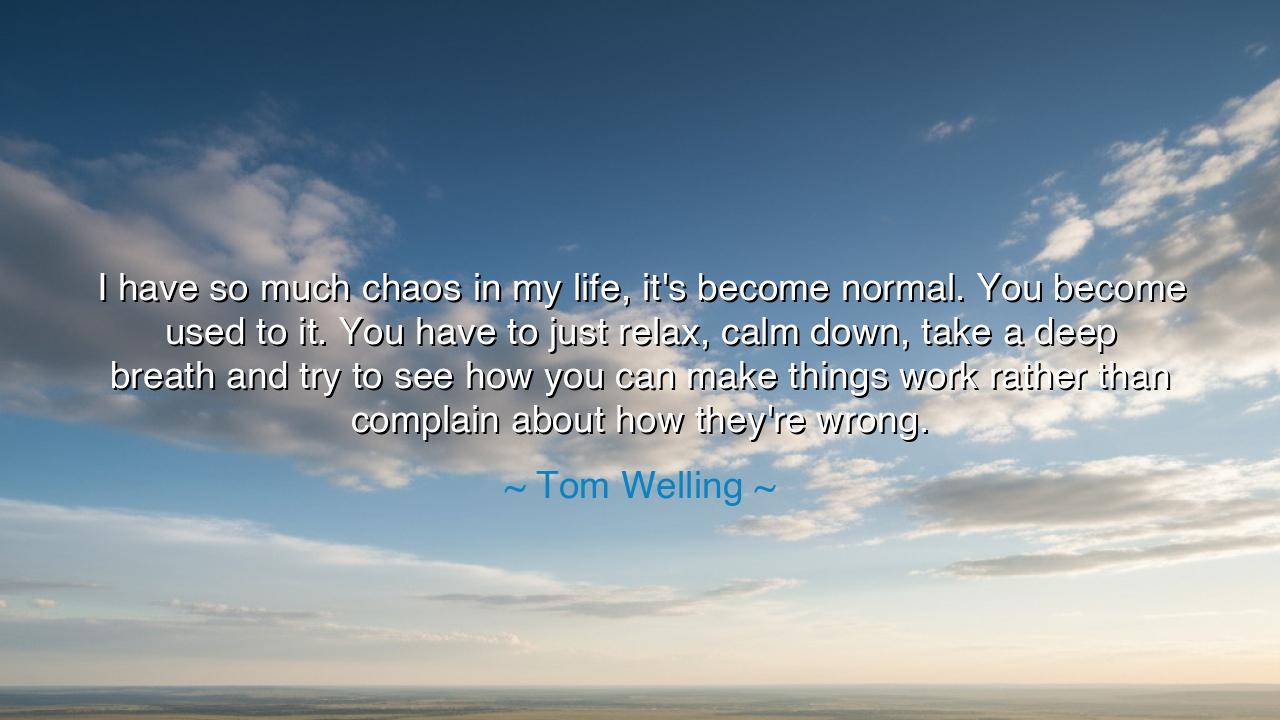
I have so much chaos in my life, it's become normal. You become
I have so much chaos in my life, it's become normal. You become used to it. You have to just relax, calm down, take a deep breath and try to see how you can make things work rather than complain about how they're wrong.






In the ebb and flow of life, we often find ourselves swept up in a current of chaos, confusion, and unpredictability. The words of Tom Welling ring true for many: "I have so much chaos in my life, it's become normal. You become used to it. You have to just relax, calm down, take a deep breath and try to see how you can make things work rather than complain about how they're wrong." In this simple yet profound statement, Welling captures the essence of human endurance: that in the face of struggle, we have a choice—not to be consumed by it, but to adapt, find clarity, and move forward with composure. The ability to navigate chaos with a calm mind is one of the greatest gifts we can cultivate, as it brings peace not only to our hearts but also to the world around us.
This wisdom is not new. The ancient Stoics, such as Marcus Aurelius and Seneca, often spoke of the importance of mastering our response to life’s unpredictability. Aurelius, in his Meditations, urged us to accept that chaos and challenges are inevitable. He did not deny the reality of struggle but emphasized that the power lies in how we respond to it. He famously wrote, "The impediment to action advances action. What stands in the way becomes the way." Here, Aurelius teaches us that the very chaos we face can become the path to our growth. When we face difficulties, we must not resist them with frustration but rather see them as opportunities to improve ourselves and the world around us.
The story of Socrates provides another powerful example of enduring chaos with grace. Though Socrates was sentenced to death for his philosophical beliefs, he remained calm and steadfast in the face of his fate. When faced with his own trial, Socrates did not rail against the unjust system that condemned him. Instead, he calmly accepted the consequences of his actions, remaining focused on what was in his control—his ability to speak the truth. His calmness in the face of what was a life-altering and deeply chaotic moment in his life reflects the very spirit that Welling describes: to accept the chaos and work with it, rather than be overwhelmed by it.
In our own lives, it can be easy to fall into the trap of seeing chaos as something that is inherently negative, something that must be fought against. But Welling’s words and the wisdom of the ancients remind us that chaos is not always a sign of wrongness—it is simply a part of the human condition. Life is unpredictable, and the challenges we face are as much a part of our journey as the moments of peace and success. Mahatma Gandhi, too, understood this principle. He faced immense struggles, both in his personal life and in his work for Indian independence, yet he remained calm, centered, and focused on his mission. Gandhi’s resilience was not about ignoring the chaos around him, but rather about maintaining his inner peace and purpose in the midst of it.
The lesson we can take from both Welling and the great philosophers is the power of perspective. When life presents us with challenges and turbulence, we often feel that we are at the mercy of circumstances. However, calmness and clarity allow us to step back and see that we have the power to shape our response. We can either succumb to frustration and complaint, or we can take a deep breath, assess the situation, and move forward with purpose and action. This is the essence of inner strength: the ability to control ourselves when everything around us seems out of control.
In our modern world, chaos can often feel overwhelming, whether in our personal lives, work, or in the broader social and political landscape. Yet, the teachings of the ancients and the example set by Welling show us that the true power lies in our ability to stay centered, even when life seems unpredictable. The key is to recognize that while we may not control what happens around us, we do control how we respond. Stress and chaos will always be a part of life, but our peace does not have to depend on the absence of difficulty. Instead, it comes from our ability to face difficulty with a calm mind and a focused heart.
So, let us follow Tom Welling’s advice and take the time to breathe. When chaos strikes, let us not be swept away by it, but instead, let us stand firm, grounded in the knowledge that we are capable of finding peace and purpose, no matter what is happening around us. Each moment of chaos is an opportunity to practice inner strength and to learn how to navigate the world with grace. Let us move through our lives with courage and calm, knowing that no matter how chaotic life may become, we always have the power to respond with clarity and purpose.






AAdministratorAdministrator
Welcome, honored guests. Please leave a comment, we will respond soon